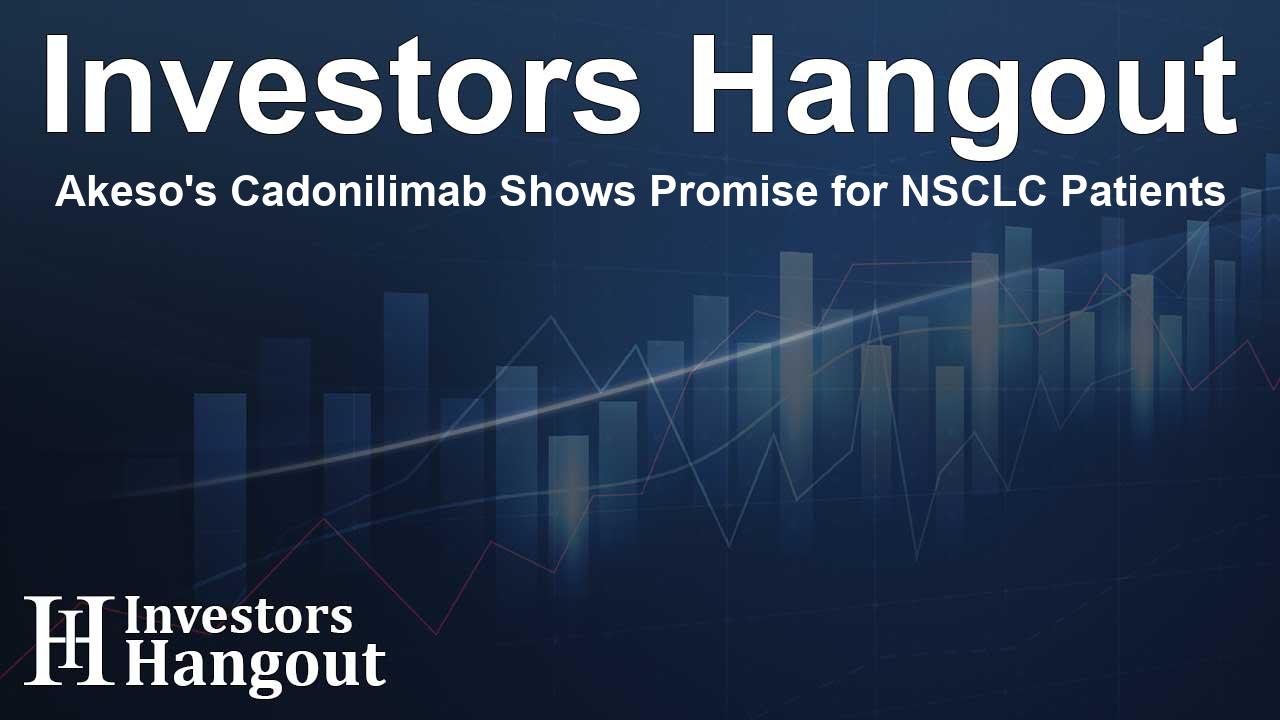Akeso's Cadonilimab Shows Promise for NSCLC Patients

Promising Results for Cadonilimab in NSCLC Treatment
In a recent oral presentation, the results of a groundbreaking study involving Akeso, Inc.'s cadonilimab, a PD-1/CTLA-4 bispecific antibody, were highlighted at a major cancer conference. The focus of this research was on its impact on patients suffering from advanced or metastatic non-small cell lung cancer (NSCLC), particularly those who have shown resistance to prior PD-(L)1 inhibitor treatments.
Insights from the Study
Professor Han Baohui from a renowned hospital shared the optimistic findings regarding cadonilimab combination therapy during the conference. Patients treated with this innovative therapy achieved impressive outcomes, including a 6-month progression-free survival (PFS) rate of 56.9% and a median PFS of 6.5 months. Moreover, the disease control rate peaked at 94.0%, indicating that nearly all participants experienced a degree of tumor control, underscoring cadonilimab's potential as a formidable second-line treatment option for this challenging cancer.
Clinical Study Overview
The clinical trial, known as the AK104-IIT-018 study, was conducted as a prospective, open-label, single-arm, multi-center Phase Ib/II study, exploring cadonilimab's effectiveness. This study, initiated in early 2023, focused on patients who had unresectable, incurable locally advanced or metastatic NSCLC. Participants had previously undergone treatment combining PD-1/L1 inhibitors with platinum-based chemotherapy, further complicating their treatment landscape.
Study Details and Patient Demographics
As of May 31, 2024, the trial included 46 patients, with a diverse representation of cancer types: 41.3% were diagnosed with non-squamous NSCLC, while 58.7% had squamous NSCLC. The expression levels of PD-L1 among the participants varied, with some revealing levels that fall below the typical threshold for effective treatment response.
Evaluating PFS and Tumor Response
The PFS was notably impressive, with maturity showing a robust response rate compared to standard treatments. With a median PFS of 6.5 months, cadonilimab outperformed docetaxel alone. Notably, the objective response rate (ORR) recorded at 30.3% also surpassed earlier rates observed in traditional therapies.
Safety Profile and Tolerability
Another major highlight of this study was the favorable safety profile associated with cadonilimab when used in conjunction with anlotinib and docetaxel. Most patients tolerated the treatment, and adverse effects were manageable, enhancing the therapy's attractiveness as a viable option for patients facing limited choices.
The Role of Cadonilimab in Future Cancer Treatment
For patients grappling with advanced, driver gene-negative NSCLC post-primary treatment, the options remain extremely limited. Current guidelines suggest single-agent chemotherapy, which, while established, results in relatively low response rates. In response to this gap, cadonilimab's dual-target approach may fill an important niche in treatment regimens for immune-resistant NSCLC.
Cutting-Edge Mechanisms of Cadonilimab
Cadonilimab is designed uniquely to promote immune normalization within the tumor microenvironment, making it a promising player in modern cancer therapies. Its innovative structure allows for greater accumulation in tumor tissues, increasing its effectiveness while minimizing adverse reactions.
Akeso's Commitment to Innovative Treatments
Akeso, Inc. (9926.HK) stands at the forefront of biopharmaceutical innovation, having established a comprehensive R&D system that nurtures the development of groundbreaking medical solutions. The company continues to evolve by focusing on several promising treatments, including cadonilimab, and has amassed a portfolio that reflects its commitment to addressing critical unmet medical needs.
Frequently Asked Questions
What is cadonilimab?
Cadonilimab is a PD-1/CTLA-4 bispecific antibody developed by Akeso, aiming to improve treatment outcomes for patients with resistant NSCLC.
What were the study results for cadonilimab?
The study showed a 6-month PFS rate of 56.9% and a disease control rate of 94.0%, indicating its effectiveness.
How does cadonilimab work?
Cadonilimab targets two immune checkpoints, PD-1 and CTLA-4, enhancing immune response against tumors.
Why is patient enrollment important in trials like this?
Enrolling diverse patients helps ensure that findings are comprehensive and applicable to the broader population of NSCLC patients.
What is the future of cadonilimab in cancer therapy?
Cadonilimab shows promise for replacing traditional therapies, especially for patients with limited options after prior treatments.
About The Author
Contact Olivia Taylor privately here. Or send an email with ATTN: Olivia Taylor as the subject to contact@investorshangout.com.
About Investors Hangout
Investors Hangout is a leading online stock forum for financial discussion and learning, offering a wide range of free tools and resources. It draws in traders of all levels, who exchange market knowledge, investigate trading tactics, and keep an eye on industry developments in real time. Featuring financial articles, stock message boards, quotes, charts, company profiles, and live news updates. Through cooperative learning and a wealth of informational resources, it helps users from novices creating their first portfolios to experts honing their techniques. Join Investors Hangout today: https://investorshangout.com/
The content of this article is based on factual, publicly available information and does not represent legal, financial, or investment advice. Investors Hangout does not offer financial advice, and the author is not a licensed financial advisor. Consult a qualified advisor before making any financial or investment decisions based on this article. This article should not be considered advice to purchase, sell, or hold any securities or other investments. If any of the material provided here is inaccurate, please contact us for corrections.
